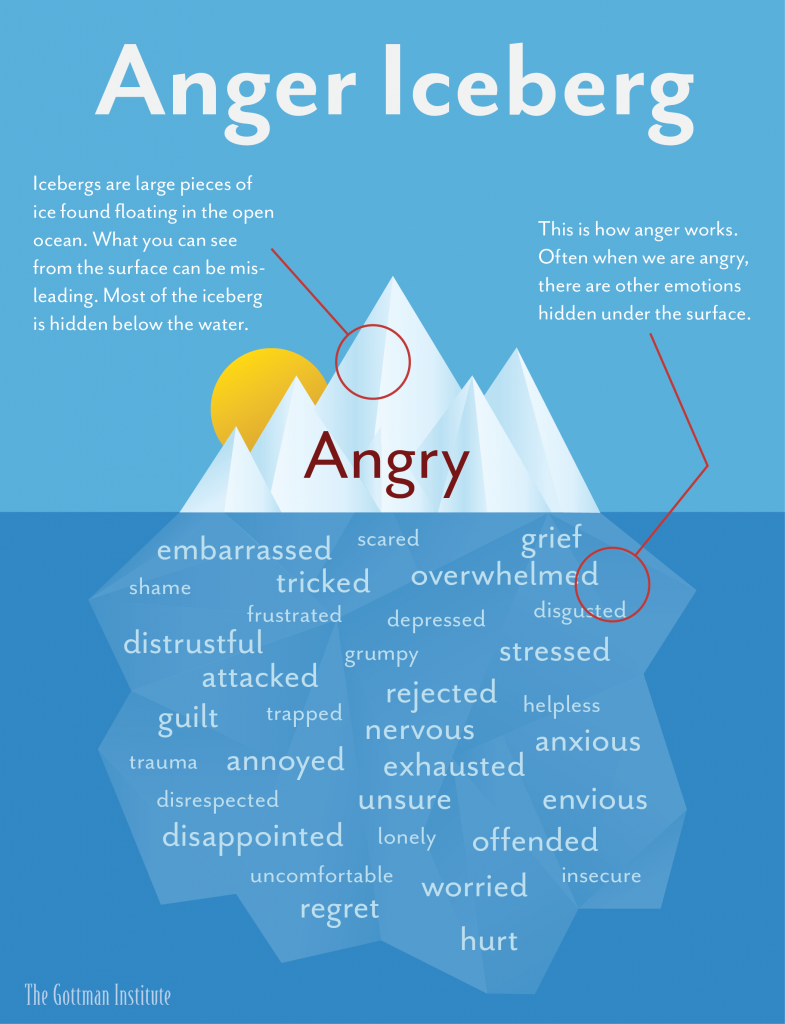Motherhood unleashed within me raw and powerful emotions that frightened me. I never knew I could feel such rage come from within me, emotions that I couldn’t control. I have a circle of tolerance but very often, whenever my central “HOT” button is pressed, I lash out quickly and often times with harsh words.
It could be that incessant crying.
An annoying request to buy that toy for the 20th time.
My child throwing a tantrum over something I can’t comprehend.
I thought I was a relatively patient person prior to having kids, but having consistent angry outbursts scared me. If you ask me what was the tipping point that triggered those outbursts, I recall that most of it stemmed from other feelings… being exhausted, stressed, feeling out of control of a situation… it was hardly ever one thing. As I learnt to deal with my children’s angry outbursts and my own, one concept that really stood out for me was this Anger iceberg.
According to this Gottman article, other emotions and feelings may lurk below the surface of anger. Sometimes it’s embarrassment, loneliness, depression, or fear. Other times, it’s a combination of several feelings. Our brain reads anger as a signal to protect us. Once we acknowledge its presence, we can really dig deep to understand what lies beneath.
Awareness creates understanding. Once I understood this, I could process my emotions and finally deal with the anger I felt. I know that my angry reactions will never create a positive response. So once I was able to handle anger, I could role model it to my kids.
These realizations and actions helped me in my anger management and creating a calmer environment in my home:
1. Let go of other stresses
When I am faced with work related stress, I try to leave that at the door before I face my children. When I walk through the doors to my home, what kind of face or expression would I want to bring with me? Who am I when I greet my children? Making a conscious decision to come home with a different mindset has helped me a lot.
2. Walk away before you explode
If I am starting to feel really annoyed and my circle of tolerance seems to be getting smaller by the minute, I know that I might explode the next minute. I need to get away from the source of irritation till I calm down. I usually say to my child that is pushing that button, “Mummy is really annoyed right now at your behaviour, and I need some time to myself. I’ll come back and deal with you later.”
3. Manage your tone of voice
This is within my control. I can choose to lash out with harsh and unkind words, or I can choose to breathe, speak calmly without sarcasm or yelling.
4. Choose non-fighting words
If I lash out with angry words, I will likely get another angry reaction from my child… two people with angry, fighting words will only get wounded in the process. Remember that we are not against one another, we are family.
5. Don’t give in
If the argument is over something that is out of your boundary (for example, throwing a tantrum because you didn’t buy a toy), don’t give in just because you want your child to stop screaming.
6. Take responsibility
There are days when I have failed to control my anger. I have to take responsibility to admit that I lost my temper and tell my kids, “I am sorry I yelled at you yesterday. I should have walked away to calm down first.”
7. Deal with my issues
I had to really dig deep to figure out what I was going through during the season when I was constantly angry at my kids. It took some quiet, reflective moments for me to realise patterns in my own life that were unhealthy and needed to be pruned. I had to face the ugliness within me so that I could emerge a better person.
I am glad that I am able to manage my spontaneous angry outbursts a lot better these past few years. With young children, they are still premature in learning how to process their feelings, so I’ll share some other strategies in how we can help our children manage their anger in a separate article.
Featured image by David Garrison from Pexels





